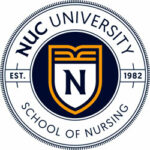
Mission, Vision and Philosophy
Mission
The graduates of NUC University, upon licensure, will be proficient professionals with a strong commitment toward the discipline of nursing and public service. They will be critical/ethical thinkers who use positive clinical judgment in their professional practice within the multidisciplinary health team and their service to diverse individuals, families and the community. As such, they will be committed to learning, as a dynamic and continuous process, throughout life.
Vision
The creation of nursing professionals committed to confident and competent practice as leaders in new healthcare trends and challenges for the improvement of a diverse, dynamic and complex society.
Philosophy
The Nursing Department believes in the individual and professional development of our nursing students, so they can become responsible citizens with the ability to work effectively for their own well-being, making significant contributions to society, to the economy of Puerto Rico and to the world in general. Our department is inspired by the highest human values and sound principles of professional nursing practice.
In addition, the Nursing Department believes in:
Nature of Person:
Each individual is a unique personality who is shaped by their genetic and environmental exposure to the world. In turn this forms a person’s moral and ethical value system. Through a process of growth and development, the individual reaches adulthood where the expectation is that of a responsible being who promotes independent and competent thinking with socially acceptable actions. Human life has value and every person has the right to achieve their optimum state of health (wellness).
Nature of Society:
Every human being is a social being. Individuals may form community aggregates to satisfy their needs, whether that is a family, a local, regional or national community or the world. It is the society that determines the mores and values that regulate its existence. These interactions are the basis for the type of socialization that exists among its members. It is through the family and society that a human being acquires knowledge and internalizes values. Individuals, families and, social groups work together on their individual and collective behaves to effectively and significantly contribute to the bio-psychosocial, economical welfare and quality of life for all.
Health:
Society must be healthy in order to survive. Health within the society is a continuous and cyclic process that is defined within the individual, family, groups (both small and larger) and the global community. Optimum health is more than the absence of physical illness as it also includes the mind and spirit. There are various levels on the health/illness continuum – primary, secondary and tertiary, which emphasizes that an individual’s health can vary according to their own life stage and development. Maximum health can, therefore, include illness prevention; promotion and maintenance of health; or, maintenance of disease.
Nature of Nursing:
Nursing is the art and science of holistically caring for individuals, families and communities. It draws on the biological and social sciences as the background for providing care and incorporates the fine arts into one’s portrait of wholeness for the person – maximum physical, mental, social and spiritual welfare. Within its realm is the ability to think critically, draw conclusions, make decisions and act with clinical judgment in different scenarios within various cultural venues. Nursing includes both dependent and independent functions in relation to the multidisciplinary healthcare team.
Teaching/Learning:
Through instruction or study, skills and knowledge are acquired. This is learning. Through the recognition of an individuals’ learning style, faculty facilitates student learning. Teaching strategies are student entered and selected to encourage autonomy and self-direction while providing individual support. These strategies encourage critical thinking, exploration of research and evidence based practice. Learning is meaningful when faculty plan and select rich and varied experiences that progress from the simple to complex. Participation in learning is necessary for achieving goals and establishing patterns of life-long learning. This life-long process may include the desire to: continue learning, seek answers for questions, remain connected with the profession, create new personal opportunities, etc.
Nursing Education:
Nursing education is a systematic and continuous process based on scientific knowledge. It includes both general education and nursing specific content. It is further defined, in Puerto Rico; according to the type of nursing practice, the individual will perform (Rule 254).
The LPN a person who performs selective care to individuals, which requires skill and judgment proper to their nursing training, but not the knowledge required of advanced practice nurses, specialists, generalists or associate degree nurses, and therefore, can only work under the direction of these or of physicians and dentists authorized to practice in Puerto Rico.
The ADN or associate nurse may perform basic client care skills under the direction of a general BSN nurse, doctor or dentist in hospitals, doctors’ offices, laboratories, ambulatory and elderly care facilities.
The BSN or general nurse may perform independently across the life care spectrum and in all healthcare environments.
The professional MSN can act in a manner independently and may exercise the private practice in Puerto Rico and the United States offering their services through contract with agencies or individuals in any setting in your area of practice.








